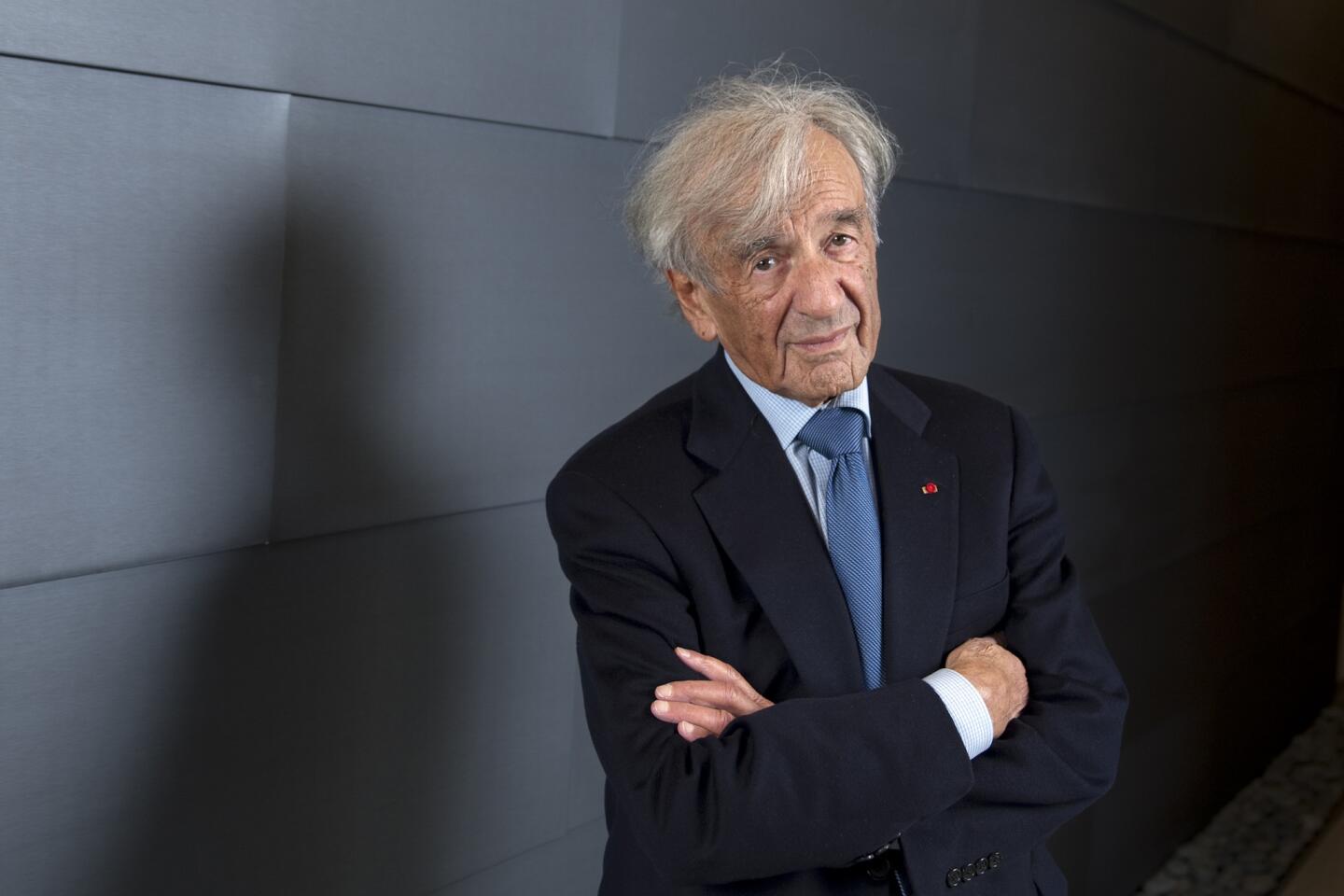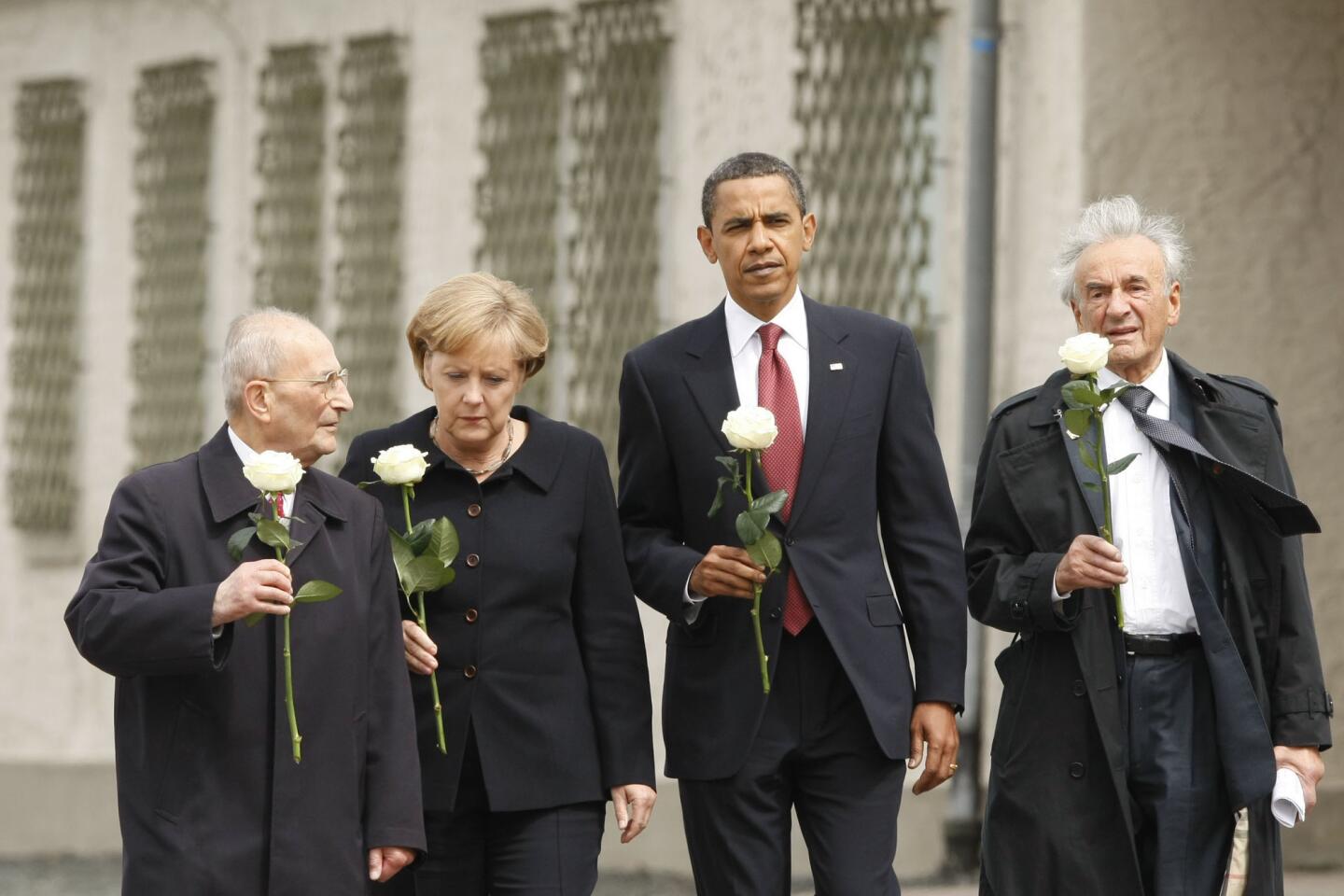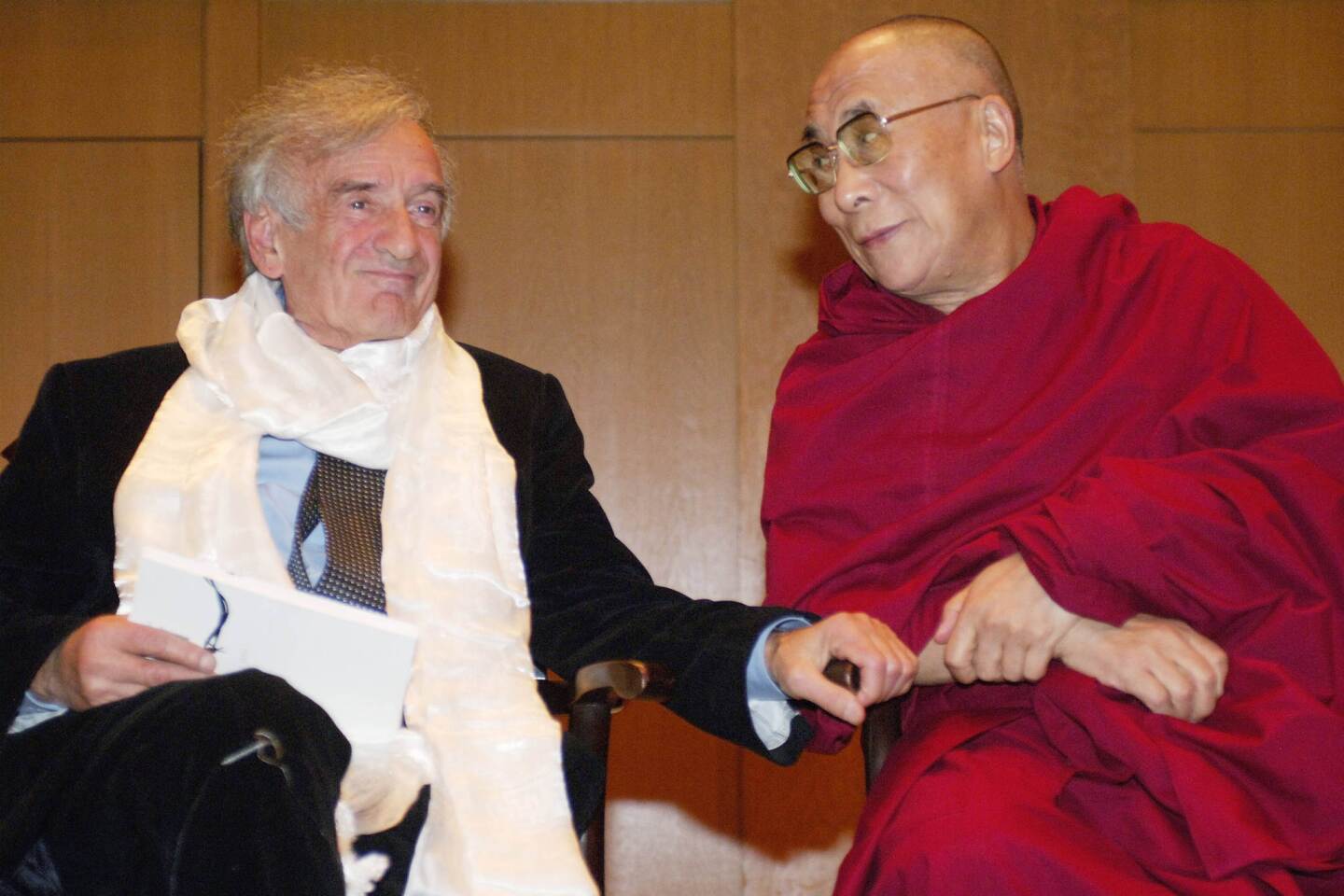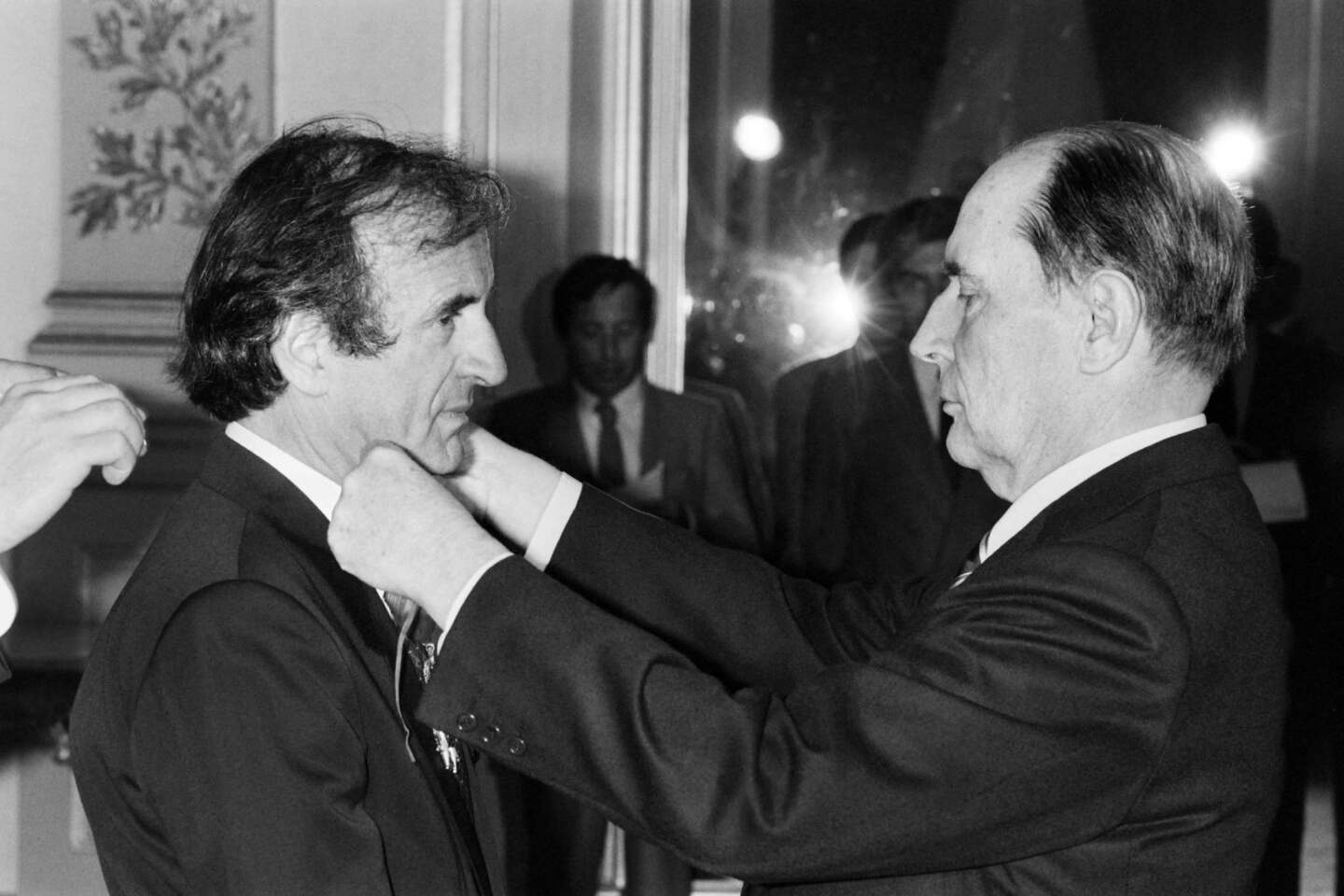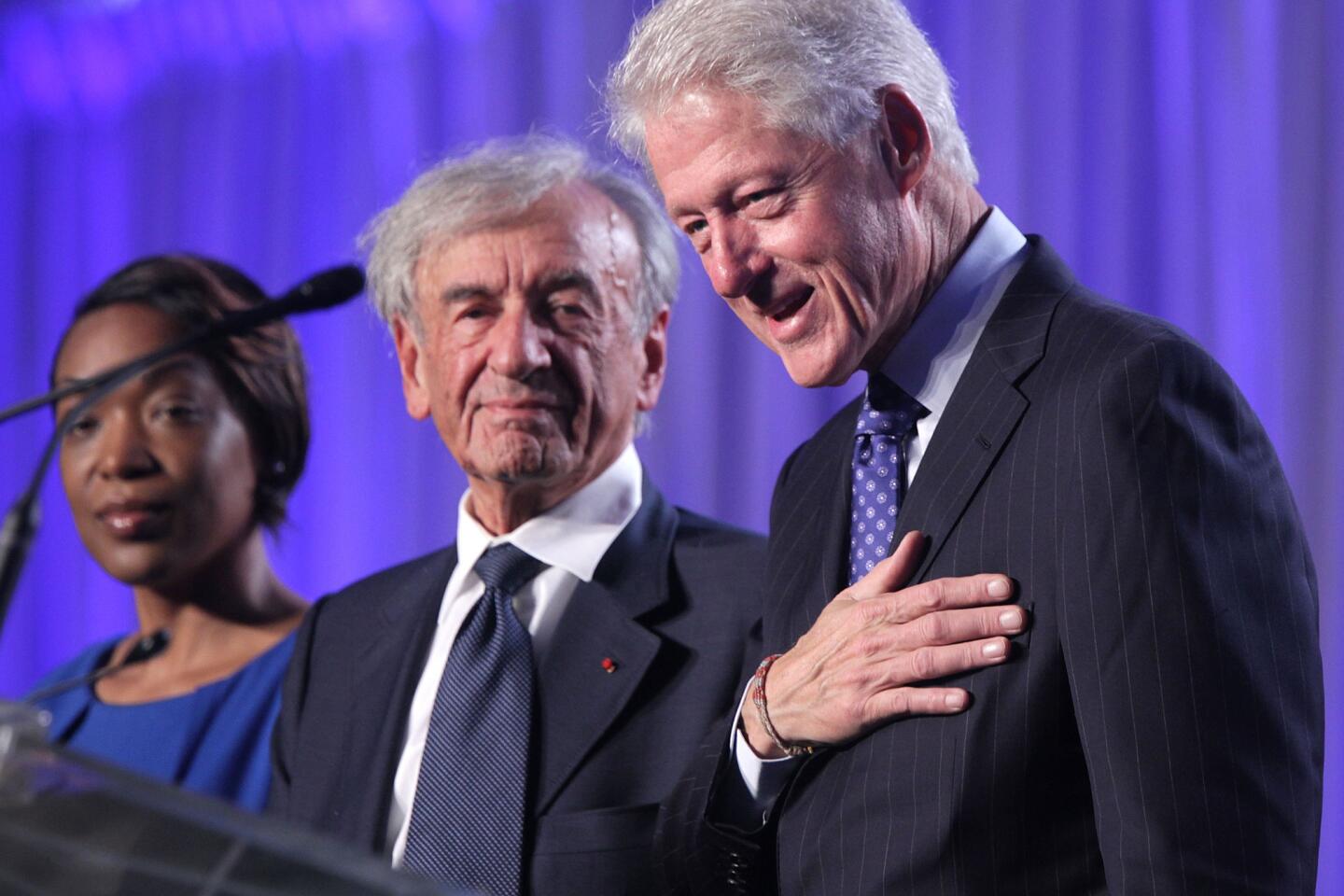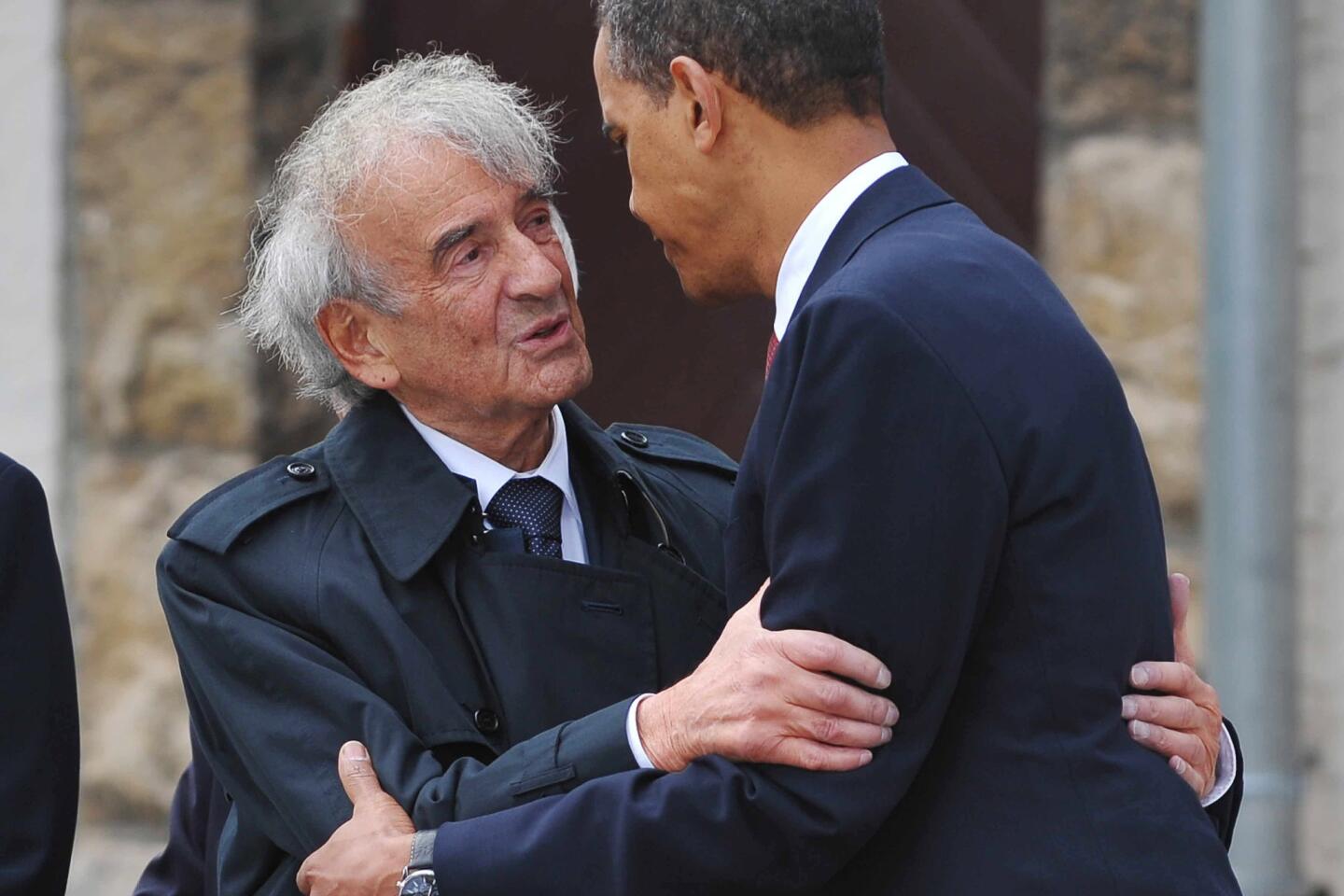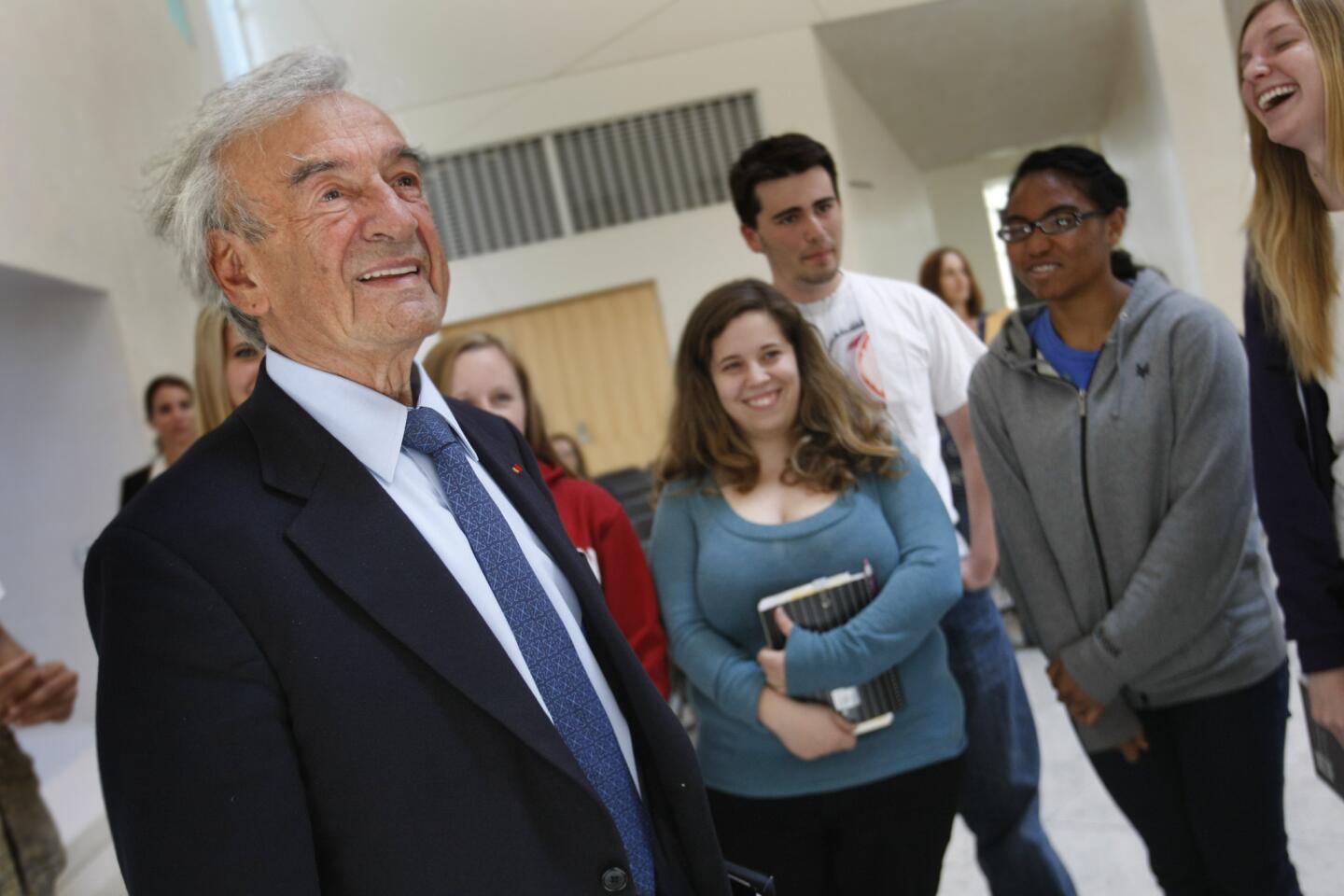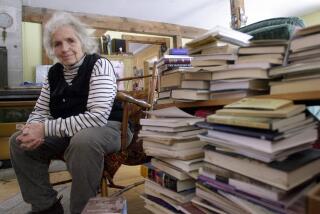Elie Wiesel dies at 87; Nobel Peace Prize laureate and renowned Holocaust survivor
- Share via
Elie Wiesel, the Nazi concentration camp survivor, Nobel Peace Prize winner and author whose seminal work “Night” is regarded as one of the most powerful achievements in Holocaust literature, has died, Israel’s Yad Vashem Holocaust Memorial said. He was 87.
Based on his experiences and those of other Holocaust survivors, Wiesel wrote dozens of semi-autobiographical books, memoirs and plays. His message “of peace, atonement and human dignity” earned him the Nobel prize in 1986.
For a decade, he was silent about the horrors he witnessed after being transported by train to Auschwitz with his parents and three sisters when he was 15.
After a year, he was liberated at the end of World War II with other prisoners from the German camp Buchenwald — and soon learned that his mother and younger sister had been killed in the gas chambers. He already had seen his captive father die a brutal death.
First penned in Yiddish, the harrowing yet unsentimental account based on Wiesel’s year in the death camps was published in French in 1958 and eventually printed in more than 30 languages.
President Obama issued a statement Saturday, calling Wiesel a “dear friend” and recounting their visit together in 2009 to Buchenwald, where more than 50,000 people were killed during the Nazi regime.
“Elie Wiesel was one of the great moral voices of our time, and in many ways, the conscience of the world,” Obama said. “Elie was not just the world’s most prominent Holocaust survivor, he was a living memorial. After we walked together among the barbed wire and guard towers of Buchenwald where he was held as a teenager and where his father perished, Elie spoke words I’ve never forgotten — ‘Memory has become a sacred duty of all people of goodwill.’ Upholding that sacred duty was the purpose of Elie’s life.”
In a statement released Saturday night, Prime Minister Benjamin Netanyahu said that Israel and the Jewish people mourned the passing of Wiesel. “Through his unforgettable books, moving words and personal example, Elie personified the triumph of the human spirit over the most unimaginable evil,” Netanyahu said.
The first version of “Night” — originally called “And the World Remained Silent” — ran 800 pages, but it had been drastically shortened by the time it debuted in the U.S. in 1960 to positive reviews and lukewarm sales.
Elie Wiesel opened the eyes of the world to the Holocaust with his penetrating books.
— Rabbi Marvin Hier, founder of the Simon Wiesenthal Center
The Nation called it “the single most powerful literary relic of the Holocaust,” and The New York Times said it was “a slim volume of terrifying power.” It also was recognized as one of the first books to raise a haunting question for people of faith: Where was God at Auschwitz?
Wiesel later theorized that the public wasn’t ready for such a graphic account of the Holocaust. “The Diary of Anne Frank” had sold well when it was published in the U.S. in 1952, but the diary of the Jewish teenager’s life in hiding from the Nazis did not extend to the concentration camp where she died.
Rabbi Steve Leder, who serves at the Wilshire Boulevard Temple in Los Angeles, first encountered Wiesel’s writing as a 12-year-old boy at his family’s home in Minnesota. Serving as a witness, Leder said, was at the foundation of Wiesel’s “very being.”
“I remember reading ‘Night’ in my little bedroom in the basement in the middle of the winter, and just being utterly astounded by the reality and the horror of the Holocaust from the perspective of a teenager,” Leder said. “Because he was a teenager when he was at Auschwitz. It resonated very, very deeply and profoundly with me.”
The news of Wiesel’s death hit hard for Los Angeles physician Gary Schiller, who served six years as chairman of the Los Angeles Museum of the Holocaust. Schiller, the son of a concentration camp survivor, said he responded by taking Wiesel’s “Night” and “The Fifth Son” off the shelf and showing them to his 10- and 12-year-old sons.
Schiller said told his sons of Wiesel’s tremendous influence and the importance of firsthand accounts of the Holocaust.
“It will be very difficult to give them the same degree of insight without people like Wiesel, or their grandfather, to tell them very directly what they experienced,” he said.
Through his words and his work, Wiesel spent his life preparing future generations for the day when there would no longer be a living witness to the Holocaust, Leder said.
“That places a tremendous responsibility on the next generation to continue to tell the story,” he said.
When Nazi war criminal Adolf Eichmann went on trial in 1961, it brought the Holocaust renewed attention in mainstream America and heightened the visibility of Wiesel and other survivors who were writing their stories. Wiesel’s books were largely well-reviewed, but over time, some critics questioned his role as a self-appointed witness to history.
In 1985, Wiesel received one of the highest U.S. civilian honors, the Congressional Gold Medal. The controversy caused by his acceptance speech inadvertently brought greater attention to “Night,” he later said. The speech urged President Reagan to forgo a trip to West Germany that included Bitburg Military Cemetery, where many Nazi SS soldiers who deported Jews and ran concentration camps are buried.
“That place is not your place, Mr. President,” Wiesel said. “Your place is with the victims of the SS. The issue here is not politics, but good and evil. And we must never confuse them.” Reagan went to Bitburg but added a stop at a concentration camp.
By the 1990s, “Night” was a standard high school and college text, selling an estimated 400,000 copies a year. When Oprah Winfrey selected an updated version of the book for her television book club in 2006, it became a bestseller but reignited a debate over whether it was a novelized memoir. Wiesel maintained that it was a true account.
Using his personal story as both a testimonial and departure point for his writing, he earned a reputation as the leading spiritual archivist of the Nazi persecution of the Jews.
He never put to rest a question that had haunted him since the war: Why did those who knew about the Nazis’ effort to exterminate the Jews not do more to prevent it? “The free world, including Jewish leaders in America and Palestine, had known since 1942, but we knew nothing,” he wrote in his 1995 memoir, “All Rivers Run to the Sea.” “Why didn’t they warn us?”
Wiesel has taken the Jew as his metaphor — and as his reality — in order to unite a moral and aesthetic vision in terms of all men.
— The Washington Post, 1968
Small in stature with a melancholy nature, he explored the themes of guilt, psychic trauma, endurance and the necessity to remain hopeful about the future despite the worst injustices. Questions about justice, human dignity and ethnic hatred that Wiesel repeatedly returned to soon were recognized as issues common to every race, ethnicity and culture.
“Wiesel has taken the Jew as his metaphor — and as his reality — in order to unite a moral and aesthetic vision in terms of all men,” the Washington Post said in 1968.
When Wiesel received the Nobel Peace Prize, the committee called him “a messenger to mankind” who had come to speak for “all oppressed people and races,” emerging as a spiritual leader and guide “in an age when violence, repression and racism continue to characterize the world.”
On a humanitarian trip to a Cambodian refugee camp in 1980, Wiesel explained his empathy for the oppressed: “I came here because nobody came when I was there. One thing that is worse for the victim than hunger, fear, torture, even humiliation, is the feeling of abandonment, that nobody cares, the feeling that you don’t count.”
Eliezer Wiesel was born Sept. 30, 1928, in Sighet in what is now Romania, a remote farming community where his father, Shlomo Wiesel, was a grocer. Many relatives of his mother, Sarah, were rabbis, and he was raised an Orthodox Jew in the Hasidic tradition.
He had planned a career writing about religion and “the great eternal subjects: love and happiness.” Instead, near the beginning of “Night,” he describes the cattle car packed with Jews that took his family to Auschwitz:
“On the third night, while we slept, some of us sitting one against the other and some standing, a piercing cry split the silence: ‘Fire! I can see a fire!’ ... There was a moment’s panic. Who was it who had cried out? It was Madame Schachter….
“She continued to scream, breathless, her voice broken by sobs. ‘Jews, listen to me! I can see a fire! There are huge flames! It’s a furnace!’…
“Our terror was about to burst the sides of the train. ... It was as though madness were taking possession of us all. ... Some of the young men forced her to sit down, tied her up, and put a gag in her mouth.”
Within hours of arriving in Poland at Auschwitz, Wiesel and his father were transferred to Buna in Germany, where they spent most of their imprisonment. “Logically, I shouldn’t have survived,” Wiesel wrote in his 1995 memoir. “Sickly, timid, fearful, and lacking all resourcefulness, I never did anything to stay alive.”
In January 1945, Wiesel and his father were forced to undergo a 10-day “death march” with other prisoners from Buna to Buchenwald in Germany. Upon arriving, his father died of dysentery, starvation and exhaustion.
Our terror was about to burst the sides of the train. ... It was as though madness were taking possession of us all.
— Elie Wiesel in “Night”
Three months later, the Nazis fled the camp as Allied Forces were about to break through the gates. Among 400 children taken to a Normandy youth home, Wiesel soon was reunited with his two older sisters, Hilda and Batya.
“It was a miracle,” he told UPI in 1987. Hilda had seen his picture with a newspaper article about child survivors.
From 1948 to 1951, Wiesel studied literature and philosophy at the Sorbonne in Paris. Fluent in French, he worked as a journalist in France for Yiddish and French publications, which led to an interview with novelist Francois Mauriac, who encouraged him to write about his experiences and helped him find a French publisher.
Wiesel turned to novel writing to explore the psychological turmoil of Holocaust survivors. In “Dawn” (1961), he wrote of a young death-camp survivor who joins Palestine’s freedom fighters and is horrified when he realizes that he has become a killer. Wiesel had been a freedom fighter but never saw combat.
In “The Accident” (1961), a journalist and death-camp survivor struggles with the idea that he may have attempted suicide when he was struck by car. Wiesel said he had wondered these same thoughts after being seriously injured in 1956 by a New York City taxi.
A series of articles about the life of Jews in communist Russia soon followed. Collected into a 1966 book, “The Jews of Silence,” they established Wiesel as a leading voice against anti-Semitism.
At 40, Wiesel married Marion Erster Rose in 1969. A Vienna native, she was a survivor of death camps and had a daughter, Jennifer, from a previous marriage. The couple had one son, Shlomo Elisha, and two grandchildren.
His wife was also his translator, turning most of his books from their original French — the language in which he usually wrote — to English. They included 2012’s “Open Heart,” a reflection on his heart surgery and life in the face of death.
Wiesel joined the faculty of City University of New York in 1972 and taught Jewish studies. Four years later, he moved to the humanities department at Boston University, commuting from his home in Manhattan. He had been a U.S. citizen since 1963.
In 1978, President Carter appointed him to a commission that eventually created the Holocaust Museum in Washington, D.C.
Elie Wiesel: Embracing memory and madness »
Wiesel realized his childhood goal to write about religion beginning in the 1970s and co-authored several books with religious and world leaders, including “A Journey of Faith” (1990) with New York Cardinal John O’Connor and “Memoir in Two Voices” (1996) with former French President Francois Mitterrand.
The Elie Wiesel Foundation for Humanity — established with his Nobel Prize money — announced in 2008 that it had lost more than $15 million through investments with Wall Street financier Bernard L. Madoff, whose Ponzi scheme defrauded thousands of individuals and charities of billions.
Wiesel and his wife lost their life savings. “This was a personal tragedy where we discovered all of a sudden what we had done in 40 years — my books, my lectures, everything — was gone,” Wiesel said in a public discussion of the Madoff case. He called Madoff a “sociopath” and “scoundrel” but told the AP, with a wry grin: “I’ve seen worse.”
Times staff writer David Zahniser in Los Angeles and Josh Mitnick, a special correspondent in Tel Aviv, contributed to this report.
Rourke and Nelson are former Times staff writers.
ALSO
Elie Wiesel, history’s witness
Holocaust survivors gather to mark 1945 liberation from Auschwitz
From the archives: Elie Wiesel on Anne Frank
Elie Wiesel a beacon for human rights
UPDATES:
6:20 p.m.: This post has been updated with comments from President Obama and others.
4:00 p.m.: This story has been updated with statements from Israeli dignitaries and others.
More to Read
Sign up for Essential California
The most important California stories and recommendations in your inbox every morning.
You may occasionally receive promotional content from the Los Angeles Times.
